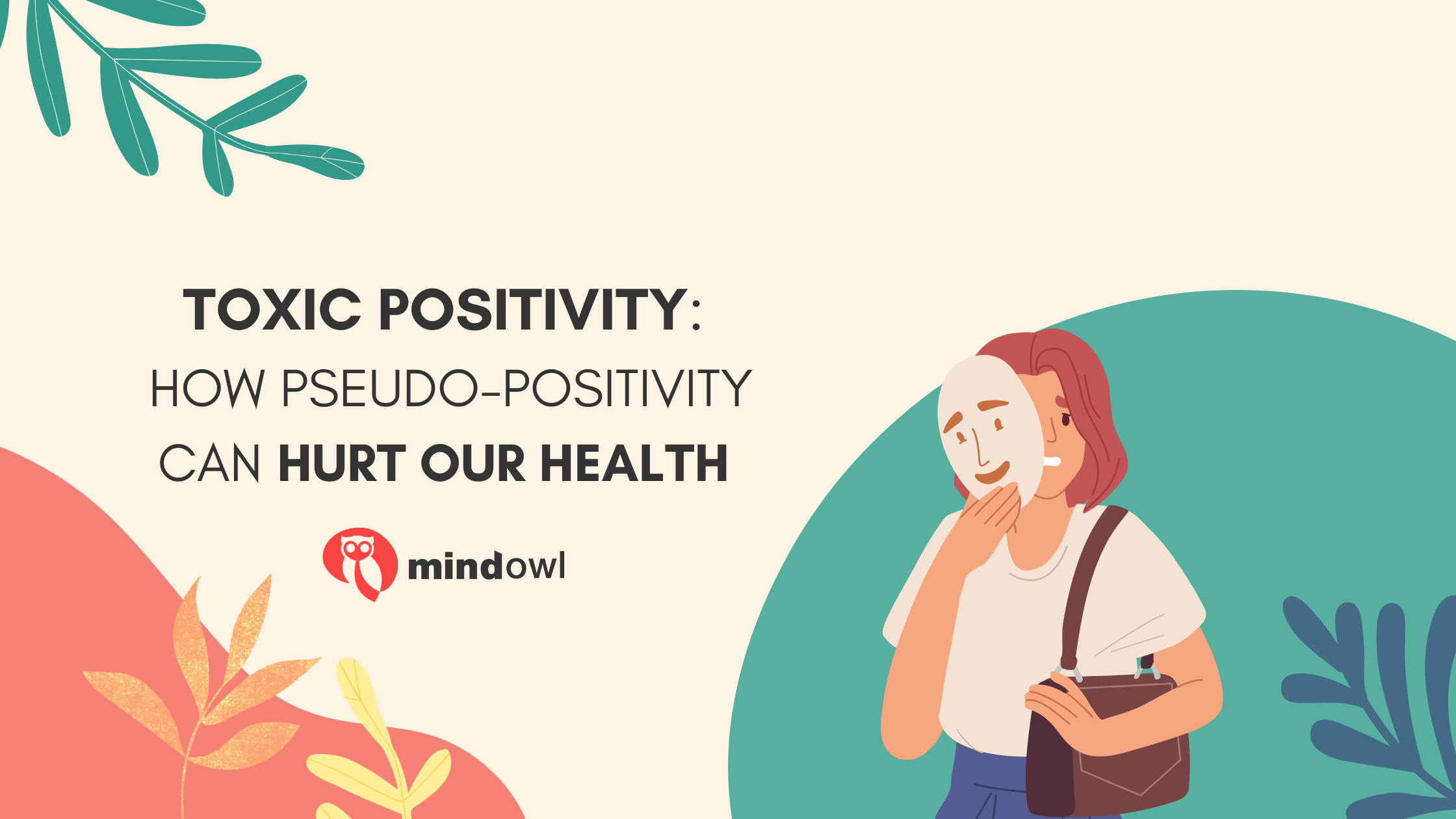In recent years social media and lifestyle blogs have been flooded with encouragements to find the silver lining with mantras like, “good vibes only”, or “think positive”. On the surface, these well-intentioned messages may seem like the perfect attitude to adopt when dealing with feelings of sadness, loneliness or anxiety, or when trying to support someone close to you who is struggling with painful or uncomfortable emotions. The messages are all positive, optimistic, and appear supportive. However, there is a darker side to this level of positivity that may result in even worse mental health issues, and that is what we are going to be discussing in today’s article.
Like everything in life, positivity has a dark side. This is what we would refer to as ‘toxic positivity’. If you have never heard this term before then you might be feeling a bit confused; what’s the harm in being positive and looking on the bright side? Don’t worry, today we’re going to be explaining exactly what this means, as well as how to spot it, why you should stop participating in it, and how to deal with difficult feelings in a healthy way.
What is Toxic positivity?
Let’s start by defining toxic positivity. The way in which we would define toxic positivity is as a mindset or manner of being in which a person will reject bad emotions or events by adopting a mask of positivity and optimism.
We refer to this as a mask because, as we are all aware a natural part of life is pain, heartbreak, grief and so many other negative, strong feelings – therefore, when someone behaves in a way that suggests they do not experience any of these emotions it is likely that they are not allowing themselves to have an authentic experience of their true feelings as a coping mechanism.
Therefore, when people advocate for this optimistic outlook, they ultimately lead others and themselves to feel worse, by not allowing them to experience the full range of emotions and experiences that are normal in everyday life.
How to spot toxic positivity
Toxic positivity comes in many forms, but the underlying message is always the same; your emotional experience is not valid. Consider you have just been made redundant from your job. This is undeniably going to be a negative experience for many people. Even if you hated that job, your boss was mean, your colleagues were rude, and the pay wasn’t fair – you will still feel a multitude of unpleasant emotions. You might feel rejected, annoyed, frustrated that you gave so much time to this job, and on top of this you will probably be feeling worried about finding a new job before the bills start piling up.
In your perspective, there aren’t many ways to spin this as a positive experience. However, when you tell friends and relatives, you might be met with responses like, “at least you’re getting redundancy pay”, “you didn’t even like that job, anyway”. In essence, you are being told, “it could be worse.” And although this is true, it does not mean that it isn’t bad and that your stress and worry aren’t a normal response. Happy people can still feel hurt or upset; this is the human experience.

Toxic positivity in the pandemic
The current Covid-19 global pandemic is a clear example of where repressed emotions can be really harmful. As this has been an international event that we have all experienced, there have been varying degrees of objective suffering. And while many of us can feel grateful that we have not suffered as significantly as others, this does not mean that we have not suffered at all.
Messages of hope and optimism at this time have a different effect from those of positivity, as they acknowledge the negative. Whereas, if we are being told to focus on only the good or on all the ways that we are better off than others, we will never get the chance to confront our own very real pain. When daily levels of pain, discomfort, and grief are much higher than they have been previously, it is completely normal to feel sad, depressed, anxious, all of which can also take a toll on our physical health.
Each emotion is as valid as the next; what’s more, they each have a purpose. So, it is essential that we can recognise our own authentic emotions.
The dangers of toxic positivity
If given a choice, I’m sure most of us would choose to have a sunny, positive outlook on life rather than a gloomy, negative one. However, just as we have discussed above, there are events in all our lives that will bring up negative feelings. So far, we have mentioned the Covid-19 pandemic and redundancy, but there is a never-ending list of events that might cause us to have an unpleasant reaction. We will all lose a loved one; we will all be rejected from a job we wanted or must end a meaningful relationship. It can even come on a smaller scale, maybe our favourite TV show comes to an end, or our new top gets stained the first time we wear it. Whether trivial or serious, we will all experience challenging or difficult emotions at some point in our lives, and these can only harm us more as repressed emotions.
We have a choice then to either deal with these moments in a healthy or unhealthy way. Toxic positivity manifests itself in a very harmful way, as it is a method of suppressing our unwanted feelings rather than accepting them. Potentially the most damaging aspect of toxic positivity is its ability to invalidate our uncomfortable emotions. In fact, it even encourages us to ignore our mental health and feign a positive state of mind even in the face of objectively negative moments.
Signs of toxic positivity
There are some signs you can look out for in your daily life to identify if you or those around you are practising toxic positivity:
- You dismiss the feelings of others
A key feature to look out for in yourself is the dismissal of other people’s feelings. You might find yourself in a situation where a friend is telling you all about the terrible day they have been having, and rather than expressing an understanding of their pain, you try to convince them that their day has not been as bad as they believe. Worse still, you might ignore them altogether and try to deflect the conversation onto a more positive emotion.
- You feel guilty whenever you feel negative emotions
Another way that toxic positivity can manifest itself is if you notice that you are feeling guilty for having emotions like sadness or anger. Essentially you have decided that there is no place for any negative feeling and that whenever one does arise, it is not valid.
- You hide your negative emotions from others
As a reaction to the guilt, you might feel when a difficult emotion arises you may decide to hide that from those closest to you. When asked about how you feel about a challenging situation, you might pretend that you are completely fine, rather than being honest about how you feel.
- You ignore your problems
This type of behaviour can continue into denial. As well as hiding your real feelings from family and friends, you might also start to push them to the back of your own mind. Rather than deal with your problems, you might let them sit, unresolved at the back of your mind and direct all your focus onto the positive aspects of your life.
- You use positive mantras to cope with negative feelings
It is very easy to say things like “stay positive”, or “you’ll get over it” but much harder to live them. We have very little control over our minds, exemplified by Daniel Wegner’s White Bear experiment. If you are unfamiliar, the thought experiment’s general concept is to ask the participant not to think of a white bear. Inevitably the participant will not stop thinking of a white bear after the suggestion is made, concluding that we do not have any control over our minds.
And this is relevant to the subject of positive mantras as they are often used to cope with negative emotions. However, you will never be successful in controlling your thoughts, so it is often better to confront and accept your feelings rather than try to alter them.
Replace toxic positivity with meditation
How do we see our way through all the negative moments in life if we are expected to be wary of positivity? We are not asking you to simply give in to sadness, anger, or grief. We can use meditation to practise acceptance of our negative emotions. By meditating on our challenging moments and emotions, we can view them without judgement, with no desire to replace them with fake positivity, and we allow ourselves to work through them.
So next time you are told to “look on the bright side”, remember that although this advice isn’t meant to hurt you, it is essential that you first deal with your negative emotions in a constructive and non-judgemental way. If you experience persistent depression, anxiety, or any other negative emotion, and they start to seriously affect your day-to-day life, then it may be a good idea to seek medical advice. However, it is never advisable to just ignore or repress emotions, as they will rise up eventually and create more damage than if they were acknowledged dealt with in a healthy way, through meditation or any other form of acceptance.
MindOwl Founder – My own struggles in life have led me to this path of understanding the human condition. I graduated with a bachelor’s degree in philosophy before completing a master’s degree in psychology at Regent’s University London. I then completed a postgraduate diploma in philosophical counselling before being trained in ACT (Acceptance and commitment therapy).
I’ve spent the last eight years studying the encounter of meditative practices with modern psychology.


